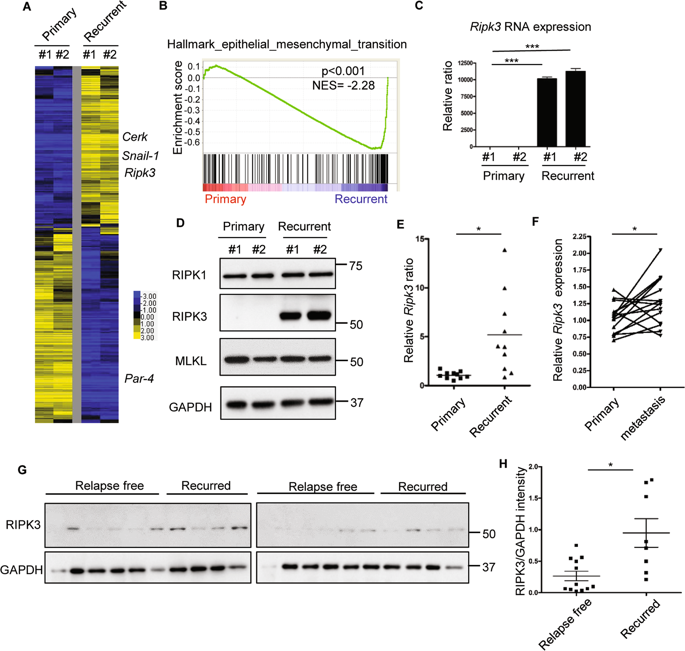当前位置:
X-MOL 学术
›
Cell Death Differ.
›
论文详情
Our official English website, www.x-mol.net, welcomes your
feedback! (Note: you will need to create a separate account there.)
RIPK3 upregulation confers robust proliferation and collateral cystine-dependence on breast cancer recurrence.
Cell Death and Differentiation ( IF 13.7 ) Pub Date : 2020-01-27 , DOI: 10.1038/s41418-020-0499-y Chao-Chieh Lin 1, 2 , Nathaniel W Mabe 3 , Yi-Tzu Lin 4 , Wen-Hsuan Yang 1, 2, 5 , Xiaohu Tang 6 , Lisa Hong 7 , Tianai Sun 1, 2 , Jeremy Force 8 , Jeffrey R Marks 9 , Tso-Pang Yao 3 , James V Alvarez 3 , Jen-Tsan Chi 1, 2
Cell Death and Differentiation ( IF 13.7 ) Pub Date : 2020-01-27 , DOI: 10.1038/s41418-020-0499-y Chao-Chieh Lin 1, 2 , Nathaniel W Mabe 3 , Yi-Tzu Lin 4 , Wen-Hsuan Yang 1, 2, 5 , Xiaohu Tang 6 , Lisa Hong 7 , Tianai Sun 1, 2 , Jeremy Force 8 , Jeffrey R Marks 9 , Tso-Pang Yao 3 , James V Alvarez 3 , Jen-Tsan Chi 1, 2
Affiliation

|
The molecular and genetic basis of tumor recurrence is complex and poorly understood. RIPK3 is a key effector in programmed necrotic cell death and, therefore, its expression is frequently suppressed in primary tumors. In a transcriptome profiling between primary and recurrent breast tumor cells from a murine model of breast cancer recurrence, we found that RIPK3, while absent in primary tumor cells, is dramatically reexpressed in recurrent breast tumor cells by an epigenetic mechanism. Unexpectedly, we found that RIPK3 knockdown in recurrent tumor cells reduced clonogenic growth, causing cytokinesis failure, p53 stabilization, and repressed the activities of YAP/TAZ. These data uncover a surprising role of the pro-necroptotic RIPK3 kinase in enabling productive cell cycle during tumor recurrence. Remarkably, high RIPK3 expression also rendered recurrent tumor cells exquisitely dependent on extracellular cystine and undergo necroptosis upon cystine deprivation. The induction of RIPK3 in recurrent tumors unravels an unexpected mechanism that paradoxically confers on tumors both growth advantage and necrotic vulnerability, providing potential strategies to eradicate recurrent tumors.
中文翻译:

RIPK3 上调赋予乳腺癌复发强大的增殖和侧枝胱氨酸依赖性。
肿瘤复发的分子和遗传基础是复杂的且知之甚少。RIPK3 是程序性坏死细胞死亡的关键效应因子,因此,其表达在原发性肿瘤中经常受到抑制。在来自乳腺癌复发小鼠模型的原发性和复发性乳腺肿瘤细胞之间的转录组分析中,我们发现 RIPK3 虽然在原发性肿瘤细胞中不存在,但通过表观遗传机制在复发性乳腺肿瘤细胞中显着重新表达。出乎意料的是,我们发现复发性肿瘤细胞中的 RIPK3 敲低减少了克隆形成的生长,导致胞质分裂失败、p53 稳定,并抑制了 YAP/TAZ 的活性。这些数据揭示了促坏死性凋亡 RIPK3 激酶在肿瘤复发期间促进细胞周期的惊人作用。值得注意的是,RIPK3 的高表达还使复发性肿瘤细胞高度依赖细胞外胱氨酸,并在胱氨酸剥夺后发生坏死性凋亡。RIPK3 在复发性肿瘤中的诱导揭示了一种意想不到的机制,该机制自相矛盾地赋予肿瘤生长优势和坏死易损性,为根除复发性肿瘤提供了潜在的策略。
更新日期:2020-01-27
中文翻译:

RIPK3 上调赋予乳腺癌复发强大的增殖和侧枝胱氨酸依赖性。
肿瘤复发的分子和遗传基础是复杂的且知之甚少。RIPK3 是程序性坏死细胞死亡的关键效应因子,因此,其表达在原发性肿瘤中经常受到抑制。在来自乳腺癌复发小鼠模型的原发性和复发性乳腺肿瘤细胞之间的转录组分析中,我们发现 RIPK3 虽然在原发性肿瘤细胞中不存在,但通过表观遗传机制在复发性乳腺肿瘤细胞中显着重新表达。出乎意料的是,我们发现复发性肿瘤细胞中的 RIPK3 敲低减少了克隆形成的生长,导致胞质分裂失败、p53 稳定,并抑制了 YAP/TAZ 的活性。这些数据揭示了促坏死性凋亡 RIPK3 激酶在肿瘤复发期间促进细胞周期的惊人作用。值得注意的是,RIPK3 的高表达还使复发性肿瘤细胞高度依赖细胞外胱氨酸,并在胱氨酸剥夺后发生坏死性凋亡。RIPK3 在复发性肿瘤中的诱导揭示了一种意想不到的机制,该机制自相矛盾地赋予肿瘤生长优势和坏死易损性,为根除复发性肿瘤提供了潜在的策略。











































 京公网安备 11010802027423号
京公网安备 11010802027423号